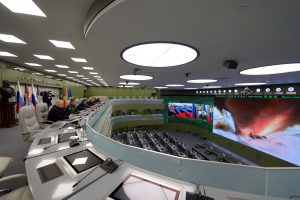
MOSCOW (Reuters) – President Vladimir Putin said on Wednesday that Russia would deploy its first regiment of hypersonic nuclear-capable missiles next year, saying the move meant his country now had a new type of strategic weapon.
Putin was speaking after overseeing what the Kremlin said was a pre-deployment test of the new missile system, called Avangard.
“This test, which has just finished, ended with complete success,” Putin told a government meeting.

Russia’s President Vladimir Putin (5th L) visits the National Defence Control Centre (NDCC) to oversee the test of a new Russian hypersonic missile system called Avangard, which can carry nuclear and conventional warheads, in Moscow, Russia December 26, 2018. Sputnik/Mikhail Klimentyev/Kremlin via REUTERS
“From next year, 2019, Russia’s armed forces will get the new intercontinental strategic system Avangard … It’s a big moment in the life of the armed forces and in the life of the country. Russia has obtained a new type of strategic weapon.”
Russia has said the new missile system, one of several new weapons Putin announced in March, is highly maneuverable, allowing it to easily evade missile defense systems.
Putin remotely observed Wednesday’s test from a Russian defense ministry building in Moscow. The Kremlin described the test in a statement, saying that an Avangard missile, launched from a location in south-west Russia, had successfully hit and destroyed a target in the Russian Far East.
Putin announced an array of new weapons in March, including the Avangard, in one of his most bellicose speeches in years, saying they could hit almost any point in the world and evade a U.S.-built missile shield.
(Reporting by Maria Kiselyova and Polina Nikolskaya; Editing by Andrew Osborn)
